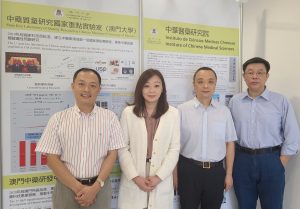A research team from the University of Macau (UM) Institute of Chinese Medical Sciences (ICMS) recently conducted a survey on the intention of Macao residents to receive COVID-19 vaccine and its influencing factors in Macao. According to the survey, 62.3 per cent of the respondents have the intention to receive COVID-19 vaccine; eight out of ten respondents say that the current vaccination programme is convenient; seven out of ten respondents believe that vaccination will help prevent the transmission of COVID-19 in the community and consider getting vaccinated their social responsibility.
The research team consists of four professors in the ICMS, namely, Carolina Ung, Yuanjia Hu, Hao Hu and Ying Bian. The survey was conducted in May 2021 in the form of online questionnaire and 552 valid questionnaires were received. According to the survey, 37.7 per cent of the respondents are hesitant or negative about vaccination. Among those who do not have plans of going out of Macao, 49.5 per cent of them are hesitant or negative about vaccination. Around 35 per cent of the respondents are worried that serious adverse reactions would occur after getting vaccinated. The analysis shows that enhancing the convenience of vaccination, promoting social responsibility, and having appropriate incentives in place are positive factors influencing the intention to receive vaccine, while concerns about serious adverse reactions after vaccination and relying on online resources for vaccine information are the negative factors.
Based on the findings of the survey, the research team has four recommendations: First, optimise the convenience of vaccination by increasing the capacity, accessibility, and mobility of vaccination sites. Second, foster partnership with appropriate organisations to disseminate vaccination information to the public through the use of multiple channels. Third, engage healthcare professionals to proactively provide scientific information on vaccination to the public to dispel doubts and rumours. Fourth, encourage the public to objectively identify the risk and benefits of getting vaccinated, in order to take preventive measures in a timely manner and assume social responsibility.
According to the research team, medical practice has shown that COVID-19 vaccination can provide effective protection for individuals, as well as for populations. International studies have also shown that vaccination can reduce the risk of infection, the severity of its symptoms, and the risk of death if infected. Clinical studies and a large number of vaccinated individuals have demonstrated that the benefits of vaccination for personal protection far outweigh the risks as most of the common adverse reactions are mild, temporary, and reversible.
In terms of infection risk analysis, although the overall situation in Macao is stable and the preventive measures have been effective, there is still a risk of imported cases. In particular, the recent occurrence of localised cases in neighbouring regions has put Macao’s preventive measures to the test. With the support of the central government, Macao has received a total of more than 600,000 doses of COVID-19 vaccine produced by Sinopharm China National Biotec Group (Beijing), which are enough to fully vaccinate at least 300,000 people. In addition, mRNA vaccines by BioNTech are also available in Macao’s vaccination programme at present. With an adequate supply of COVID-19 vaccine in Macao, it is necessary to accelerate vaccination in order to achieve herd immunity, stop the epidemic, and return the social and economic aspects of the community to normal as soon as possible.
The results of this survey have been published in preprint form online at medRxiv. The results have also been submitted to an internationally renowned journal for peer review. To read the full article, please visit https://medrxiv.org/cgi/content/short/2021.06.11.21258734v1
Source: https://www.um.edu.mo/news-and-press-releases/press-release/detail/52177/


